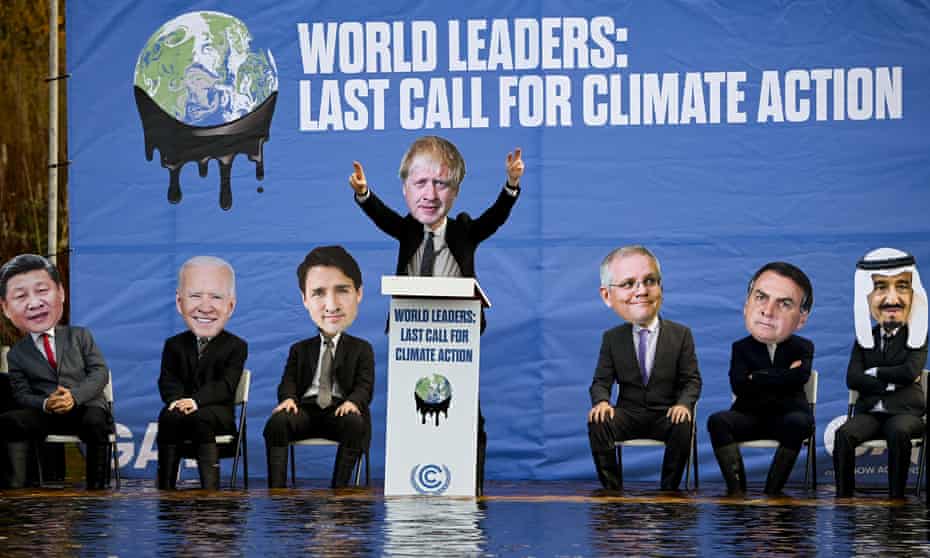Extract from The Guardian
The Guardian’s anonymous insiders respond to the publication of a draft deal at the climate conference.

First published on Thu 11 Nov 2021 02.00 AEDT
The Guardian has been speaking to climate negotiators from developing countries in the buildup to and during the Cop26 climate conference. We asked for their immediate reactions to the draft negotiation outcome published on Wednesday morning.
One secret negotiator said:
The draft covering decisions text has not come up to the global great expectations. The whole world wants a more ambitious outcome at Glasgow Cop26. But the draft covering decisions text waters down those ambitions and is not consistent with Paris agreement 1.5C goal, nor with raising ambitions [on cutting emissions].
The hope is that we have still two more days to raise mitigation [emissions-cutting] ambitions, deliver $100bn (£74bn) [that was promised from] 2020 and $100bn-plus for beyond 2025, fix article 6 rules for market mechanisms, set adaptation goals and support national adaptation plans and operationalise Santiago Network for loss and damage.
The world needs a Marshall plan to face the climate emergency humanity is now facing. We can’t let Glasgow Cop26 fail to rescue the most vulnerable now on the hook of adverse impacts of runaway climate change.
Another said:
The IPCC [Intergovernmental Panel on Climate Change] report is very clear, and the cover decision [summary of aims] needs to reiterate the messages from the IPCC report, acknowledge the gap between emissions pledges and the emissions cuts needed, and call on parties to fill the gap. Parties need to submit NDCs [nationally determined contributions] by 2022.
We also need clear language on doubling adaptation finance, and on solidarity and support from developed countries. The link between finance for developing countries and their ability to have higher ambition on cutting emissions by 2030 [which would result from that finance] is also not made clear.
Another said:
To be honest, the text is devoid of any real ambition on finance and adaptation, especially in the context of the motto of keeping the 1.5C alive. Furthermore, it seems to be a sign of sobering realisation that all the hype around Cop26 and gloss is fading and fading fast.
There seems to be some mad scramble now to kick the can on many issues down the road into next year. The so-called UK leadership does not seem to be present.
There need to be stronger words on reducing emissions in the near term, especially from developed countries, and much more than the current vague acknowledgments that more finance is needed.
A serious deal that bridges the emissions gap to achieve a path to limit warming to 1.5C must also bridge the financial gaps that are needed for developing countries to both adapt to climate change and leapfrog the fossil fuel age. Ambitious mitigation must go hand in hand with ambitious financial support to achieve this. Anything less will condemn billions to needless suffering.
Another developing country negotiator said:
“To have any chance of reaching the 1.5C target, we must have a framework that consistently encourages countries to raise ambitions, and a five-year common timeframe is the best way to do this. The current NDC commitments already have us on a 2.4C temperature rise. A five-year common timeframe allows the review and assessment of how we are doing and forces a course of action.
Despite the publicity created by pledges made last week, there are still huge leaps that must be taken if Cop26 is to be a success on climate finance. As well as the highly publicised failure to meet the $100bn target, which was intended as a floor, there are a number of other key issues.
At present, there is an imbalance in the prioritisation of mitigation finance over investment in adaptation. For the developing world, the need to scale up adaptation financing is urgent. Yet sticking points for developed nations continue to grind negotiations to a halt.
Refusals to commit to concrete financial targets, inabilities to discuss the definition of climate finance and stubbornness on the share of proceeds issue under article 6.2 are all contributing to an increasing disillusionment with this negotiation process among developing nations.
No comments:
Post a Comment